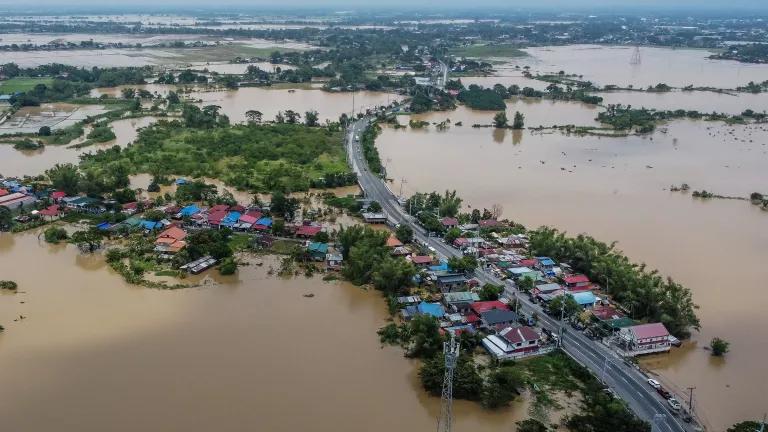Climate Change Intensified Pakistan’s Deadly Monsoon Floods by 15%, Scientists Warn of Looming ‘New Normal’ Without Urgent Adaptation Finance

By Fatima Saka
ISLAMABAD, Pakistan — A new scientific study has found that climate change made the recent monsoon rainfall that devastated northern Pakistan about 15% heavier, turning what used to be moderate seasonal rains into deadly flooding that killed more than 240 people.
The analysis, led by the World Weather Attribution (WWA) group, warns that unless urgent adaptation measures and global emissions reductions are implemented, catastrophic events like this could become routine during Pakistan’s monsoon seasons.
Researchers used climate models and historical weather data to conclude that from June 24 to July 23, the rainfall – now expected once every five years – was intensified by human-caused global warming, which has increased global temperatures by 1.3°C above pre-industrial levels.
Key Findings:
The deadly monsoon was not extreme by historical standards, but human-induced climate change amplified the rainfall by 15%.
House collapses were the leading cause of death, responsible for 164 out of 300 nationwide fatalities.
Pakistan’s vulnerability is exacerbated by informal urban housing in flood-prone zones, weak infrastructure, and inadequate flood-resilience systems.
The country needs an estimated $40–50 billion annually in climate adaptation finance to respond effectively to escalating climate impacts.
Floods Becoming the New Normal, Dr. Mariam Zachariah of Imperial College London said: “Even moderate monsoon months are now causing shocking death tolls. Without rapid transition away from fossil fuels, Pakistan will face more intense and frequent flooding.”
The WWA team included 18 researchers from Pakistan, the UK, France, and the Netherlands. Their findings are consistent with previous IPCC assessments that warn of heavier rainfall in a warming climate.
The study focused on areas in Punjab and Khyber Pakhtunkhwa, including Islamabad, Rawalpindi, Lahore, and Peshawar, where entire neighbourhoods were submerged, crops destroyed, and roads swept away.
In 2022, Pakistan experienced its worst monsoon in history, killing over 1,700 people and causing an estimated $40 billion in economic damage. Three years later, the pattern persists.
Homes, Not Just Rain, Are Killing People
Half of Pakistan’s urban population lives in informal settlements (known as kacchi abadis) made of mud and brick, often without proper drainage or structural stability. These dwellings are particularly vulnerable during heavy rainfall.
The researchers recommend flood-resilient building practices such as bamboo-framed, elevated homes and restrictions on building in riverbeds and floodplains.
Rich Nations Urged to Deliver on Climate Finance Promises
Despite contributing only 0.5% of historical carbon emissions, Pakistan remains one of the countries least prepared for climate impacts, ranked 152nd globally in climate readiness. A November 2024 report estimates $1.2 trillion in economic losses for Pakistan by 2050 without transformative adaptation.
At COP29, developed countries committed to scaling climate finance to $300 billion annually by 2035, but only $28 billion is currently being provided for adaptation – far short of the $215–387 billion needed each year.
Dr. Joyce Kimutai, also of Imperial College London, criticized the lack of urgency: “Rich countries have pledged billions in adaptation finance, but where is the money? Pakistan is being forced to divert scarce funds from essential services to disaster recovery.”
The International Court of Justice recently stated that failure by wealthier nations to fulfill climate finance obligations may be considered a violation of international law, opening the door for potential legal consequences.
2025 World Breastfeeding Week: FG to Strengthen Breastfeeding, Nutrition Security in Nigeria
Every Fraction of a Degree Matters, according Scientists, Prof. Friederike Otto, a leading climate scientist at Imperial College London, added: “At 1.3°C, Pakistan is already suffering. At 1.5°C, it will be worse. At 3°C, where we’re heading – it could be catastrophic. The technology exists to shift to renewables. What’s missing is political will.”
The WWA study will be published today, Thursday, August 7 at 4am Pakistan Standard Time, and is expected to guide policy ahead of COP30, where pressure will mount on rich nations to match words with money and help frontline countries like Pakistan withstand an increasingly hostile climate.
Source: World Weather Attribution





